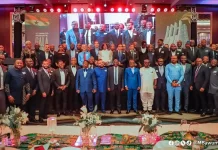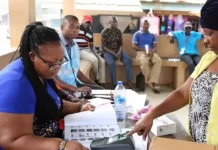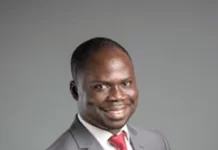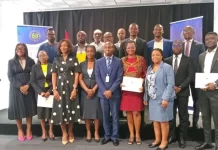
Negotiators at the Paris climate summit have been working through the night to try to reach a global agreement, with talks in their final day.
There is a widespread expectation that the deal will be signed on Friday, though the timings are uncertain.
Delegates worked through Thursday night on a draft version to iron out the key barriers to an agreement.
French Foreign Minister Laurent Fabius, who is chairing the summit, told negotiators: “I think we will make it.”
Participants at COP21 – as the UN conference is called – have been working on a draft text, prepared by the French presidency, since Wednesday.
This was seen as a significant moment after discussions that began in 2011 about a new global agreement that would stake out a long-term strategy for dealing with climate change.
Any deal signed here in Paris would come into being in 2020.
Getting shorter
Wednesday’s draft document, running to just 29 pages in total, was considerably smaller than previous versions.
The latest version, delivered after consultations throughout Thursday, was 27 pages.
Mr Fabius then led the delegates in discussion through the night.
“We are into the final lap which separates us from a universal, legally binding, ambitious, fair and lasting agreement which the world is waiting for,” he told negotiators.
The draft cut the options on the long-term goal of the proposed treaty.
The latest version says that temperature rises must be kept “well below 2C above pre-industrial levels and to pursue efforts to limit the temperature increase to 1.5C”.
The number of square brackets, indicating significant disagreement, had been reduced to around 50, a major improvement on Saturday when they ran to more than 900.
Some campaigners were not happy with Thursday’s draft, saying it denied “climate justice”.
“Rich countries have a responsibility to ensure a fair global deal for everyone, not just themselves, and as we move into these final hours of negotiations poorer countries must not settle for anything less,” said Adriano Campolina, from ActionAid.
Other groups though found positives in the latest version.
“The draft has affirmed the need to set quantified funding goals for both climate change mitigation and adaptation for the years after 2020,” said Helen Szoke from Oxfam.
“This is a very encouraging development and we strongly urge negotiators to keep this in the final agreement.”
Unanswered questions
There are still considerable difficulties about issues including climate finance and the question of demarcation between developed and developing countries.
Called “differentiation” in the negotiations, the richer nations want to change the way the world has been divided since 1992, when the UN Framework Convention on Climate Change came into being.
In their view, more emerging economies should take on more of the burden of cutting emissions and providing finance to the very poor nations hit by the impacts of rising temperatures.
The richer countries were also insisting on a single system of verification of promises for all countries.
“We feel that when parties have committed themselves to a national target that reflects their ambitions and abilities, they must be ready to tell the global community what type of progress is being made,” said Elina Bardram, the EU’s chief negotiator told reporters.
“In order for that conversation to make sense in the real world, we need to have accounting standards and principles that are common to all – otherwise you are simply comparing apples with pears.”
The hope was that on Friday the final text of the agreement would be published and a formal gathering of the parties, called a plenary session, would then convene to approve the outcome.
“We have been working for this for four years,” said Miguel Arias Canete, the EU climate commissioner.
“We cannot fail now because this is crunch time.”
By Matt McGrath
























